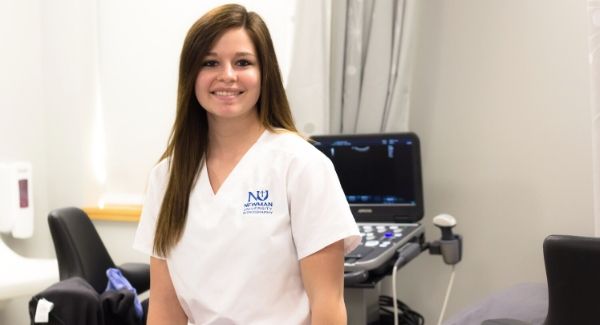Newman University is known for its popular science and allied health programs. In fact, nearly half of Newman’s programs are focused on mental and physical health.
One of those programs is diagnostic medical sonography (SONO), in which, students can work toward a Bachelor of Science degree. Once graduated, students often have a job already lined up and can work in a variety of settings; hospital or clinic settings being the most popular.
Education
Sonographers are required to have an associate degree but a bachelor’s degree can better prepare sonographers for a more diverse career path and better opportunities in the field.
Newman University offers a bachelor’s degree program and is in the process of becoming accredited. After students complete approximately two years of prerequisite courses, they can apply to enter the program, which has grown from six to a class size of 10 in the past year. The program’s professional phase lasts only three semesters.
Students are trained to become highly skilled medical professionals who perform diagnostic ultrasound testing under the supervision of a physician. Diagnostic medical sonography includes abdominal, obstetrical, vascular, cardiac and various sub-specialties.
The sonography program at Newman prepares students to take the American Registry of Diagnostic Medical Sonographers examinations in Sonography Principles and Instrumentation, Abdomen, OB/GYN and Vascular after graduation from the program.
The location of Newman in Kansas’ largest health care market allows students to connect with local health care facilities and complete clinical hours in the greater Wichita area or travel farther distances for the clinical experience. With numerous networking opportunities and a 15:1 student-faculty ratio, sonography students at Newman are given the tools and attention necessary to succeed. When on clinical rotations, that ratio drops to 2:1 or even 1:1.

Newman graduates will be equipped with the knowledge to work in a variety of health environments, sell sonography equipment or teach sonography. Most graduates accept job offers before they officially graduate.
Sonography Career Outlook
According to the U.S. Bureau of Labor Statistics, sonographers earn a median pay of $67,080 per year or $32.35 per hour. The need for sonographers is growing rapidly at 14%.
The most popular setting for sonography careers is in hospital or clinical settings but sonographers can also sell machines or teach.
Job Responsibilities
Sonographers tend to work independently with patients, administering the test, filling out patient paperwork and then presenting it all to the doctor.
It is suggested sonographers have good personal skills and pay attention to detail. The doctor only sees what the sonographer presents so paying attention and presenting correct information is highly important and can be high pressure. The information will be used to make a diagnosis.
Misconceptions
According to Newman diagnostic medical sonography program director Brooke Ward, there are two common misconceptions about sonographers.
“You either hear that they think you’re a stenographer, which is nothing medical, or people tend to think that it’s just all about babies,” she said. “So once people start to realize that we have more options, that we can look at all the things in the body, it becomes way more intriguing.”
Sonographers look at blood flow, hearts, babies and more.
“A lot of people initially come into the program, they’ll even apply for the program and just decide that they’re going to want to look at babies, which is wonderful and needed, absolutely. But once they start scanning, they’re like, ‘you know, I really do like looking at vessels and I think that’s probably where I want to specialize.’ So it’s kind of neat to see that flourish and kind of come to be their passion,” said Ward.
For more information about the diagnostic medical sonography program at Newman, contact Ward at [email protected]. Newman University admissions team can also provide information and/or a virtual tour to prospective students.

